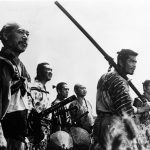This film never made it to theaters, yet it remains a Vietnamese cinematic gem worth watching. Before diving into lofty ideals, what struck me most was its raw authenticity. While many acclaimed films hit the big screen without capturing real life, Dust of Life: Chợ Lớn lingers in the shadows—much like the fates of the people it portrays.
The story centers on two rival gangs vying for control of Chợ Lớn. Tài “Grease” pushes to peddle drugs, but Hùng stands firm against it. Tensions explode when Lâm, Hùng’s younger brother, flees with his girlfriend to escape Tài’s pursuit.
What impressed me most wasn’t just the chaotic stabbings or dazzling martial arts scenes. The message that hit me hardest was the tragic fate of those denied education’s light and love’s warmth—how they drown in greed, anger, and delusion.
Tài “Grease”: Greed’s Grim Avatar
Tài “Grease” embodies deceit, betrayal, and cruelty. His eyes glare like a predator stalking prey, and even as he tears into his catch, those hungry eyes scan for the next victim. Greed strips him of humanity. Cunning and ruthless, he’ll do anything to get what he wants. His ambition drags him into a pit of ignorance he mistakes for brilliance. Chasing that peak, he plummets from a high-rise, ending his life on cold, dark, filthy concrete.
Hùng and Lâm: Strength’s Shallow Chains
Born in a slum rife with vice, brothers Hùng and Lâm learn to survive by force. Strength, victory, survival—these short-sighted notions bind them to reckless, belligerent ways. Humanity lingers in them, but their animal instincts rule as justice. Lâm, still a teenager, blindly chases a woman he thinks he loves deeply, risking the safety of brothers who’ve stood by him since childhood for her sake. Hùng, obsessed with power, can’t abandon the gangster life even after starting a family—leaving his son fatherless and his wife widowed forever.
Phong “Dust”: A Flawed Fighter
Phong “Dust” draws attention—and likely some sympathy—from viewers. Skilled in combat, handsome, lovesick, and somewhat principled, he opts out of Tài’s expansion, steering his hotheaded younger brother away from a regret-filled path like his own. It seems Phong might escape the law’s grasp, but the flicker of conscience left in him can’t tame the bloodlust of a man who’s killed too many. He seeks revenge, unaware Tài’s playing him like an executioner. Rage burns away the fragile seed of goodness tethering him to a fresh start. You might feel Phong’s invincible watching the film, but look closer—conquering countless foes means nothing when he can’t conquer himself. Maybe that tear before his end crystallizes the bitter truth he grasps too late.
A Life Worth Living?
These are people who stray far from humanity. Pushed by circumstance and temptation, they might’ve avoided such grim fates with timely reflection and a shift in perspective. Sadly, no one taught them right from wrong, and they never sought clarity within themselves.
Throughout the film, there’s no half-read book or unconditional love—just money, weapons, women, turf, and death under a bleak night sky with long, looming shadows.
Is that a life worth living?
A Mirror to the Abyss
Dust of Life: Chợ Lớn boldly recreates a living hell where ignorance drags souls down. It’s a stern warning to those lost or wavering at life’s crossroads. No one faults a stumble, but clinging to ego despite knowing better invites inevitable reckoning.
“Turn back, find the shore.” Let’s you and I keep reflecting and understanding ourselves to choose a kinder, truer way of living. For me, that’s the film’s greatest value. Though it never hit theaters, it’s been pressed onto discs and shared online. It might not be “great” in the way most expect, but it vividly captures the dark corners of wayward lives while leaving a glimmer of hope—Lâm’s redemption—at the end.
*Article includes illustrations from Pixabay.















